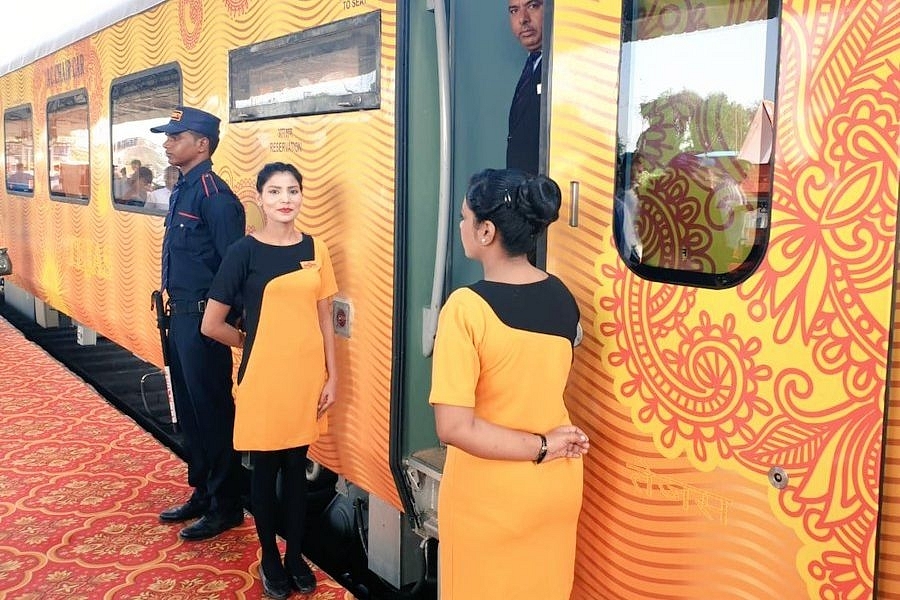News Brief
No Further Extension Beyond 35 Years For Private Trains
- The Railways is going ahead with the plan to give out 109 routes to run as many as 151 trains to private players for 35 years, for which the Request For Quote (RFQ) has been floated on 1 July.

Representative image
Responding to more than 200 queries from prospective bidders on various aspects in the private train operation project, the Railways has pointed out that there would be no extension of concession period after the end of 35 years as specified in the contract, and the operator would have to take back the trains while upgradation facilities installed by the concessionaire at maintenance depot would be transferred back to the authorities.
The role of private players in rescue and relief measures and also determining the cause in case of unforeseen incident or accident will be prescribed in the draft concession agreement.
The agreement would also have details about the mechanism to compensate the loss of the concessionaire due to fault of Indian Railways.
The Railways is going ahead with the plan to give out 109 routes to run as many as 151 trains to private players for 35 years, for which the Request For Quote (RFQ) has been floated on 1 July.
The first pre-bid conference was held on 21 July in which 16 players barring Tata and Adani groups participated.
There were a total 222 queries sent to Railways seeking clarifications and details concerning private train operations, a first such exercise in the Indian Railways.
Railways has addressed those queries and geared up for the second pre-bid meet slated on 12 August.
Addressing queries, Railways has made it clear that there will be no prescribed concessional travel in these privately operated trains, while it has agreed to facilitate visits to potential sites for the applicants to familiarise themselves with the project.
On the contentious issue of haulage charges, it has maintained that the indicative haulage cost has been kept at Rs 512.31 per km for 16 coach-trains, while the charge will be proportionately increased for trains with more than 16 coaches and the final haulage cost would be specified in the agreement.
The average cost of traction energy currently is Rs 6 per unit and the electricity bill would be on the basis of consumption.
On the revenue sharing mechanism, Railways' response is "Details related to share in gross revenue shall be specified in the draft agreement."
Railways also maintained that the tariff of private trains would be fully market-driven.
On the question of allowing full flexibility on scheduling trains within predefined time slots, the Railways said details of train operation plans shall be included as part of the draft concession agreement.
The concessionaire shall have flexibility in deciding the stoppages and fare structure, in accordance with the terms and conditions of the concession agreement.
Whether Railways would equally share the expenses for the upgradation of facilities undertaken by the selected bidder as these construction would ultimately benefit Indian Railways for enhanced safety of its train operation, Railways maintained "construction or upgradation activities are envisaged for maintenance depot, the details of which shall be provided in the concession agreement."
With zero-based time tables in the offing, there were many queries on timing and duration between destinations to which Railways maintained the "Authority is examining the suggestions received regarding train timings in clusters. The final details of train timings will be provided with the RFP."
All privately operated trains shall operate on electric traction. Railways has also made it crystal clear that the selected bidder would collect fare from the user and there would not be any upper limit imposed on the ticket price.
Though an indicative project cost has been stated in the RFQ, no basis for the same has been provided to which Railways said it broadly entails rolling stock and maintenance.
An investment of around Rs 30,000 crore from the private sector is estimated in this project.
According to the timeline, the first set of 12 private trains will arrive in April 2023 and all 151 trains will be introduced by 2027 in phase wise.
Support Swarajya's 50 Ground Reports Project & Sponsor A Story
Every general election Swarajya does a 50 ground reports project.
Aimed only at serious readers and those who appreciate the nuances of political undercurrents, the project provides a sense of India's electoral landscape. As you know, these reports are produced after considerable investment of travel, time and effort on the ground.
This time too we've kicked off the project in style and have covered over 30 constituencies already. If you're someone who appreciates such work and have enjoyed our coverage please consider sponsoring a ground report for just Rs 2999 to Rs 19,999 - it goes a long way in helping us produce more quality reportage.
You can also back this project by becoming a subscriber for as little as Rs 999 - so do click on this links and choose a plan that suits you and back us.
Click below to contribute.
Latest